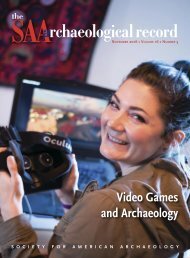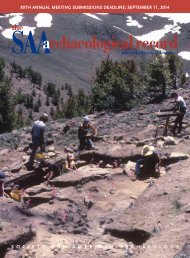SAA
SAA_Record_Nov2015
SAA_Record_Nov2015
Create successful ePaper yourself
Turn your PDF publications into a flip-book with our unique Google optimized e-Paper software.
PROS AND CONS OF CONSULTING COLLECTORS<br />
the collector noted that state and federal governments spend<br />
millions of dollars each year to survey, excavate, protect, preserve,<br />
conserve, and curate the archaeology of the United<br />
States, but that the average American citizen gets little for<br />
his money. Most of the results appear as unpublished contract<br />
reports written in an oppressive technical jargon that<br />
the public cannot decipher. Although I still disagree with the<br />
collector on many issues, we do agree on one: the average<br />
American citizen is getting short-changed in the way we<br />
present the results of public-funded archaeology to them,<br />
and we are not getting any better at doing so, in spite of our<br />
years of practice.<br />
The conversation with the collector didn’t change my stance<br />
on that particular situation, and I’m not sure it influenced<br />
my stance on my own professional perspectives about working<br />
with collectors, but it didn’t turn me into an “ethics gatekeeper”<br />
who feels obligated to pass judgment on anyone who<br />
does work with a collector. Such actions are personal and<br />
professional choices and should not be up to me to dictate,<br />
because blind adherence to a moral high-ground without<br />
examination of the specific merits of the particular case can<br />
be just as damaging as ignoring any such implications.<br />
And, I suppose, there are various levels of “collector” that<br />
must be identified here as well. The collector who gathers<br />
material from their own property or from larger geographical<br />
areas with the permission of the other landowners is certainly<br />
a different character than a collector who buys and<br />
sells artifacts commercially. Those who collect for the sheer<br />
enjoyment of owning pieces of past cultures rather than for<br />
any commercial gain should be made aware of the impacts<br />
their hobby might have on the scientific information available<br />
at those locations. It is also up to us archaeologists to<br />
educate the collector about ways of improving their recording<br />
of the contextual information that makes their hobby<br />
more useful to us.<br />
And So …<br />
And so, where do I stand on working with collectors? Pitblado<br />
(2014) writes about the ethical possibilities, noting that<br />
the <strong>SAA</strong>’s Principles of Archaeological Ethics (1996) allows<br />
practitioners a wide range of latitude in determining what is<br />
(or is not) ethical in terms of working with collectors. Such<br />
ethics statements, rather than delineating what archaeologists<br />
must do, instead offer guidance for what archaeologists<br />
can do. If we can further educate people who collect archaeological<br />
materials from private property about the importance<br />
of taking the archaeologist to the artifact rather than<br />
the artifact to the archaeologist, perhaps we can create an<br />
arrangement that will be beneficial to us all.<br />
I am not going to take the blanket stance that archaeologists<br />
shouldn’t work with collectors, but will instead urge archaeologists<br />
to work (as much as possible) with ethical people—<br />
ethical archaeologists, ethical collectors, ethical colleagues of<br />
whatever field of study— for stewardship of the archaeological<br />
record. If somewhere along the way I lose my Choctaw<br />
“heritage” because some private property owner decides to<br />
collect it, perhaps the fact that it resides in the hands of an<br />
ethical person will make it easier to swallow.<br />
Or maybe not.<br />
References Cited<br />
Gerstenblith, Patty<br />
2013 The Law as Mediator between Archaeology and Collecting.<br />
Electronic document, http://dx.doi.org/10.11141/ia.33.10,<br />
accessed August 15, 2015.<br />
Pitblado, Bonnie L.<br />
2014 An Argument for Ethical, Proactive, Archaeologist-Artifact<br />
Collector Collaboration. American Antiquity, 79(3):385-400.<br />
Society for American Archaeology<br />
1996 Principles of Archaeological Ethics. On-line document at<br />
http://www.saa.org/AbouttheSociety/PrinciplesofArchaeologicalEthics/tabid/203/Default.aspx,<br />
accessed August 25, 2015.<br />
Watkins, Joe<br />
2000 Salvaging our Ethics, Anthropology News 41(3):26-27.<br />
2003 Beyond the Margin: American Indians, First Nations, and<br />
Archaeology in North America. American Antiquity 68(2):273-<br />
285.<br />
2005 Cultural Nationalists, Internationalists, and ‘Intra-nationalists’:<br />
Who’s Right and Whose Right? International Journal of<br />
Cultural Property 12(1):78-94.<br />
16 The <strong>SAA</strong> Archaeological Record • November 2015




